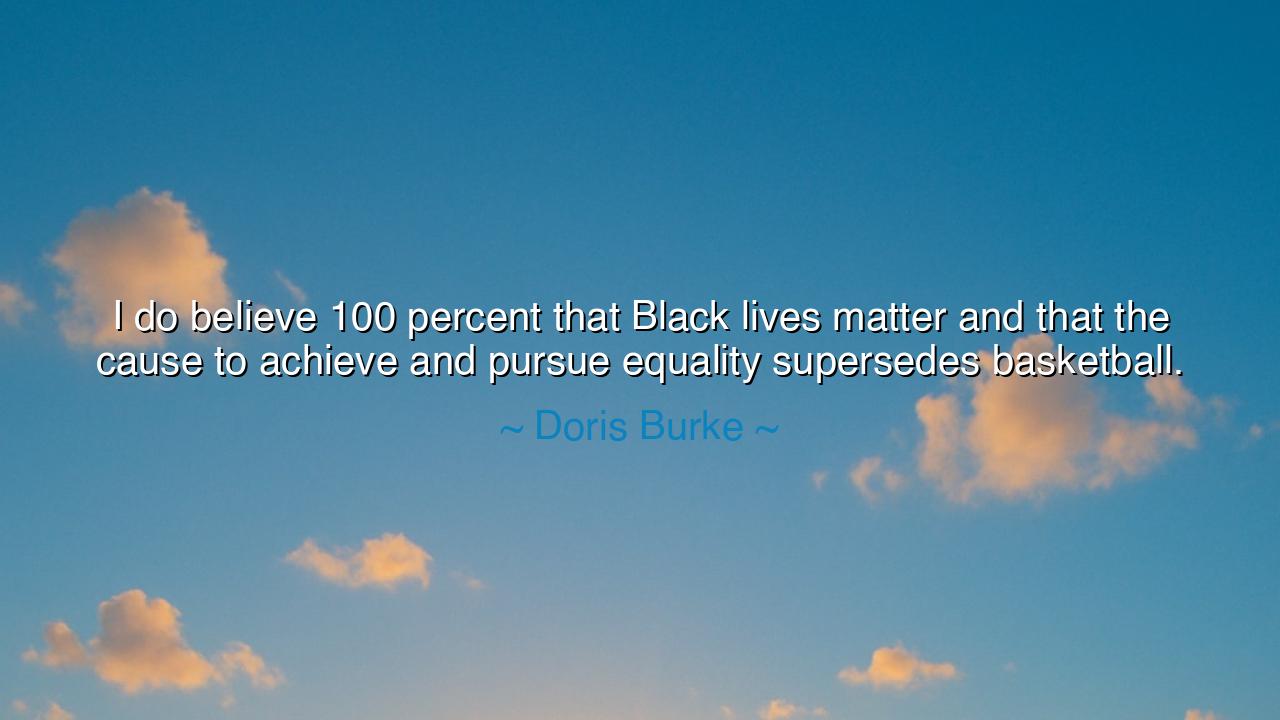
I do believe 100 percent that Black lives matter and that the
I do believe 100 percent that Black lives matter and that the cause to achieve and pursue equality supersedes basketball.






“I do believe 100 percent that Black lives matter and that the cause to achieve and pursue equality supersedes basketball.” — Thus spoke Doris Burke, a voice of clarity and conscience in the world of sport, a realm often bound by cheers and rivalry, yet not untouched by the deeper struggles of the human soul. Her words rise beyond the boundaries of the court; they carry the weight of justice, the echo of history, and the pulse of compassion. In this declaration lies a timeless truth — that there are moments when the games of men must pause, that the cause of equality must stand above the applause of the arena, and that no pursuit, however beloved, is greater than the pursuit of human dignity.
To say that Black lives matter is not merely to affirm the worth of one community; it is to proclaim the universal truth that every life, regardless of color, bears the sacred mark of humanity. Yet history, written in both sorrow and courage, reminds us that such truth has too often been forgotten. Doris Burke, in her humility and conviction, reminds us that equality is not a distraction from our daily work — it is the foundation upon which all noble work must stand. For what is victory on a court, or fame in a field, if the world beyond its boundaries remains unjust? What is triumph if it echoes in a silence built upon suffering?
The origin of this truth stretches far before Burke, far before the age of microphones and scoreboards. It lies in the ancient struggle between oppression and awakening — a struggle carried in chains and protests, in speeches and songs. It calls to mind the voice of Jackie Robinson, who broke baseball’s color barrier in 1947. Like Burke, Robinson knew that sport was not isolated from society; it was a mirror of it. Every time he took the field, he carried not only a bat, but the burden of a people yearning to be seen. His courage was not confined to the stadium; it transformed the nation’s conscience. His life proved, as Burke’s words echo now, that the pursuit of equality is larger than any game.
In the time of George Floyd, when the world saw a man’s life crushed beneath the weight of systemic injustice, the echo of conscience reached every corner of society — including the courts and fields once thought apolitical. Athletes, commentators, and fans alike awoke to a deeper truth: that sports, though powerful in unity, could not remain silent in the face of human suffering. Doris Burke’s declaration came as part of this moral awakening — a moment when the rhythm of the dribble and the roar of the crowd gave way to the stillness of reflection. She recognized that no trophy gleams brighter than the light of justice, and no championship is greater than the victory of equality over prejudice.
To say that the cause of justice “supersedes basketball” is to remember that human life itself is sacred — that the pursuit of fairness is the duty of every generation. The ancients would have called this dharma, the righteous path. For in every era, there comes a time when comfort must yield to conscience, and leisure must bow before liberty. When those who hold influence — be they kings, poets, or athletes — use their voices for the oppressed, they become more than professionals; they become stewards of the human spirit. Doris Burke’s words thus carry not only empathy but responsibility — the timeless call for those with a platform to speak for those without one.
Consider, too, the example of Muhammad Ali, who, at the height of his glory, refused to fight in the Vietnam War, declaring, “I ain’t got no quarrel with them Viet Cong.” He was stripped of his title, shunned by many, yet his defiance became an anthem of moral courage. Like Burke, he saw that sport must serve the higher purpose of truth. Through his sacrifice, he taught that integrity is worth more than applause, and that greatness lies not in victory, but in conviction.
And so, dear listener, let this teaching be your inheritance: whatever your craft, whatever your passion, remember that justice must always stand above ambition. Whether you hold a ball, a pen, or a tool, your highest calling is to preserve the dignity of all who walk beside you. Speak when silence is comfortable; act when apathy is easier. Do not let your talents blind you to the struggles that surround you. For every voice raised for equality strengthens the chorus of humanity that will one day drown out the noise of hatred and fear.
Thus, Doris Burke’s words shine as a torch for our time — simple, sincere, yet profound. They remind us that greatness is not measured by titles or trophies, but by the courage to place compassion before competition, and justice before joy. When we understand this, we no longer play merely to win, but to uplift — and in that, we find the truest victory of all.






AAdministratorAdministrator
Welcome, honored guests. Please leave a comment, we will respond soon